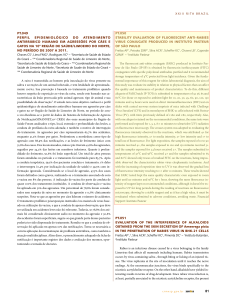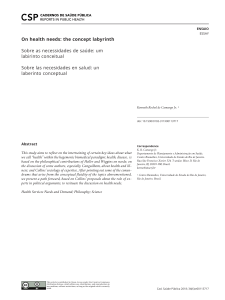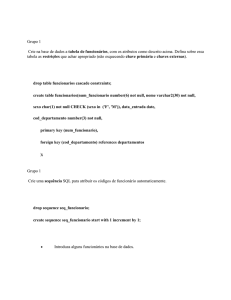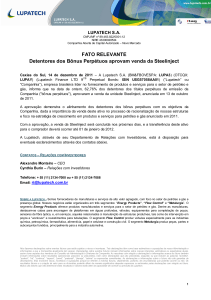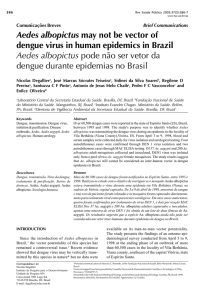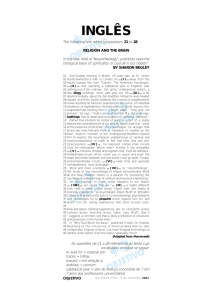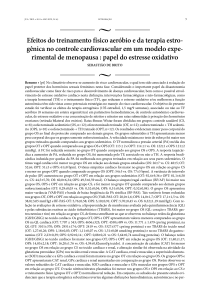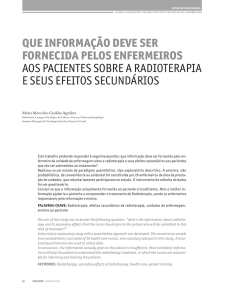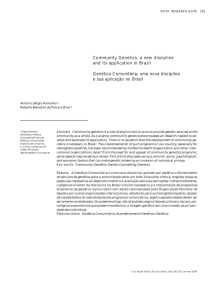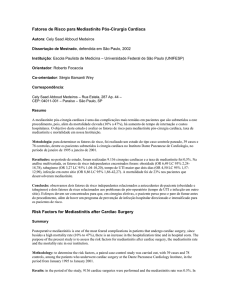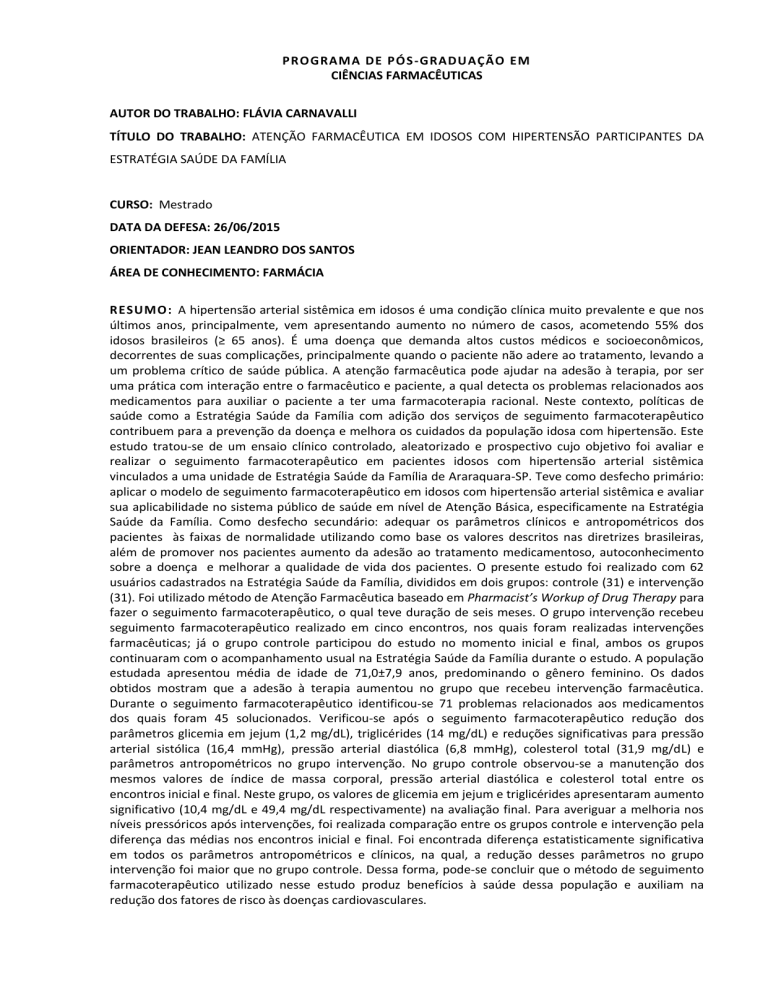
PROGRAMA DE PÓS -GRADUAÇÃO EM
CIÊNCIAS FARMACÊUTICAS
AUTOR DO TRABALHO: FLÁVIA CARNAVALLI
TÍTULO DO TRABALHO: ATENÇÃO FARMACÊUTICA EM IDOSOS COM HIPERTENSÃO PARTICIPANTES DA
ESTRATÉGIA SAÚDE DA FAMÍLIA
CURSO: Mestrado
DATA DA DEFESA: 26/06/2015
ORIENTADOR: JEAN LEANDRO DOS SANTOS
ÁREA DE CONHECIMENTO: FARMÁCIA
RESUMO: A hipertensão arterial sistêmica em idosos é uma condição clínica muito prevalente e que nos
últimos anos, principalmente, vem apresentando aumento no número de casos, acometendo 55% dos
idosos brasileiros (≥ 65 anos). É uma doença que demanda altos custos médicos e socioeconômicos,
decorrentes de suas complicações, principalmente quando o paciente não adere ao tratamento, levando a
um problema crítico de saúde pública. A atenção farmacêutica pode ajudar na adesão à terapia, por ser
uma prática com interação entre o farmacêutico e paciente, a qual detecta os problemas relacionados aos
medicamentos para auxiliar o paciente a ter uma farmacoterapia racional. Neste contexto, políticas de
saúde como a Estratégia Saúde da Família com adição dos serviços de seguimento farmacoterapêutico
contribuem para a prevenção da doença e melhora os cuidados da população idosa com hipertensão. Este
estudo tratou-se de um ensaio clínico controlado, aleatorizado e prospectivo cujo objetivo foi avaliar e
realizar o seguimento farmacoterapêutico em pacientes idosos com hipertensão arterial sistêmica
vinculados a uma unidade de Estratégia Saúde da Família de Araraquara-SP. Teve como desfecho primário:
aplicar o modelo de seguimento farmacoterapêutico em idosos com hipertensão arterial sistêmica e avaliar
sua aplicabilidade no sistema público de saúde em nível de Atenção Básica, especificamente na Estratégia
Saúde da Família. Como desfecho secundário: adequar os parâmetros clínicos e antropométricos dos
pacientes às faixas de normalidade utilizando como base os valores descritos nas diretrizes brasileiras,
além de promover nos pacientes aumento da adesão ao tratamento medicamentoso, autoconhecimento
sobre a doença e melhorar a qualidade de vida dos pacientes. O presente estudo foi realizado com 62
usuários cadastrados na Estratégia Saúde da Família, divididos em dois grupos: controle (31) e intervenção
(31). Foi utilizado método de Atenção Farmacêutica baseado em Pharmacist’s Workup of Drug Therapy para
fazer o seguimento farmacoterapêutico, o qual teve duração de seis meses. O grupo intervenção recebeu
seguimento farmacoterapêutico realizado em cinco encontros, nos quais foram realizadas intervenções
farmacêuticas; já o grupo controle participou do estudo no momento inicial e final, ambos os grupos
continuaram com o acompanhamento usual na Estratégia Saúde da Família durante o estudo. A população
estudada apresentou média de idade de 71,0±7,9 anos, predominando o gênero feminino. Os dados
obtidos mostram que a adesão à terapia aumentou no grupo que recebeu intervenção farmacêutica.
Durante o seguimento farmacoterapêutico identificou-se 71 problemas relacionados aos medicamentos
dos quais foram 45 solucionados. Verificou-se após o seguimento farmacoterapêutico redução dos
parâmetros glicemia em jejum (1,2 mg/dL), triglicérides (14 mg/dL) e reduções significativas para pressão
arterial sistólica (16,4 mmHg), pressão arterial diastólica (6,8 mmHg), colesterol total (31,9 mg/dL) e
parâmetros antropométricos no grupo intervenção. No grupo controle observou-se a manutenção dos
mesmos valores de índice de massa corporal, pressão arterial diastólica e colesterol total entre os
encontros inicial e final. Neste grupo, os valores de glicemia em jejum e triglicérides apresentaram aumento
significativo (10,4 mg/dL e 49,4 mg/dL respectivamente) na avaliação final. Para averiguar a melhoria nos
níveis pressóricos após intervenções, foi realizada comparação entre os grupos controle e intervenção pela
diferença das médias nos encontros inicial e final. Foi encontrada diferença estatisticamente significativa
em todos os parâmetros antropométricos e clínicos, na qual, a redução desses parâmetros no grupo
intervenção foi maior que no grupo controle. Dessa forma, pode-se concluir que o método de seguimento
farmacoterapêutico utilizado nesse estudo produz benefícios à saúde dessa população e auxiliam na
redução dos fatores de risco às doenças cardiovasculares.
ABSTRACT: Systemic arterial hypertension in the elderly people is a very common clinical condition, which
mainly in recent years has been showing an increase in the number of cases, affecting 55% of Brazilian
elderly (≥ 65 years old). It is a disease, which demands high medical and socioeconomic costs arising from
its complications, especially when the patient does not adhere to treatment, leading to a critical public
health problem. The pharmaceutical care can help in adherence to therapy, as it is a practice with
interaction between the pharmacist and patient, which detects problems related to drugs in order to help
patients to have a rational pharmacotherapy. In this context, health policies such as the Family Health
Strategy in addition to the pharmacotherapeutic follow-up services contribute to the disease prevention
and improve the care of elderly people with hypertension. This study was a controlled randomized,
prospective clinical trial aimed to evaluate and carry out the pharmacotherapeutic follow-up in elderly
patients with hypertension linked to a Family Health Strategy Unit of Araraquara-SP. It had as the primary
endpoint: implementing the pharmacotherapeutic follow-up model in elderly patients with systemic arterial
hypertension and evaluating its effectiveness in the public health system at the level of Primary Care,
specifically in the Family Health Strategy. And as a secondary endpoint: adequating clinical and
anthropometric parameters of patients to the ranges using the values described in the Brazilian guidelines
as a basis, besides increasing the patients adherence to drug therapy, self-knowledge about the disease and
improving the patients quality of life. This study was conducted with 62 registered users in the Family
Health Strategy, divided into two groups: control (31) and intervention (31). It was used pharmaceutical
care method based on Pharmacist's Workup of Drug Therapy to carry out the pharmacotherapeutic followup, which lasted six months. The intervention group received pharmacotherapeutic follow-up conducted in
five meetings, in which pharmaceutical interventions were performed and the control group participated in
the survey in the initial and final time, both groups continued with the usual follow-up in the Family Health
Strategy during the study. The studied population had an average age of 71.0±7.9 years, especially females.
These data suggest that adherence to therapy has increased in the group that received pharmaceutical
intervention. During the drug therapy follow-up 71 problems related to drugs were identified, of which 45
were solved. After the pharmacotherapeutic follow-up, the reduction of fasting glucose parameters
(1.2mg/dL), triglycerides (14mg/dL) and significant reductions in systolic blood pressure (16.4 mmHg),
diastolic blood pressure (6.8 mmHg), total cholesterol (31.9 mg/dL) and anthropometric parameters in the
intervention group were verified. In the control group it was observed the maintaining of the same body
mass index values, diastolic blood pressure and total cholesterol between the initial and final meetings. In
this group, values of fasting glucose and triglyceride showed a significant increase (10.4 mg/dL and 49.4
mg/dL respectively) in the final evaluation. In order to ascertain the improvement in blood pressure after
intervention, it was carried out the comparison between the control and intervention groups by the
difference in mean initial and final meetings. Statistically significant differences were found in all
anthropometric and clinical parameters, in which the reduction in the intervention group was higher than
the control group. Thus, it can be concluded that the pharmacotherapeutic follow-up method used in this
study produce health benefits in this population and aid in the reduction of risk factors for cardiovascular
diseases.
BANCA EXAMINADORA:
BANCA EXAMINADORA:
Titulares:
1. Prof. Dr. JEAN LEANDRO DOS SANTOS - ORIENTADOR
2. Prof. Dr. JOSÉ LUIZ RIANI COSTA
3. Prof. Dr. MARCELO TADEU MARIN
Suplentes:
1. Profa. Dra. CHUNG MAN CHIN
2.Profa. Dra. FABIANA ROSSI VARALLO
BIBLIO TECA DEPOSITÁRIA:
Biblioteca da Fa culda de de Ciências Farmacêuticas de Araraquar a -UNESP - Rodovia
Araraquara-J aú, k m 1 – Araraquara- SP

